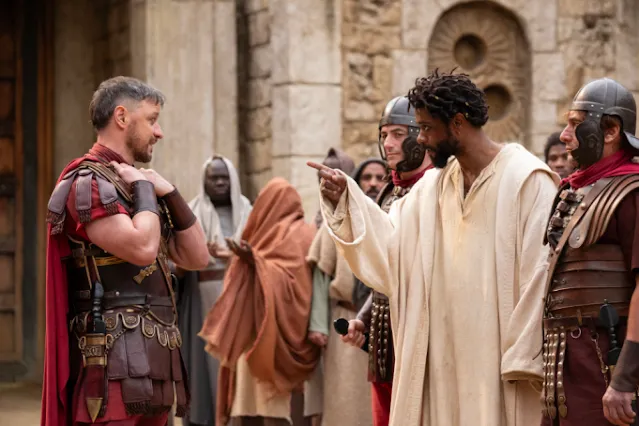The Book of Clarence: A Holy Hustle with Soul
 |
| Image: Courtesy of Legendary Entertainment |
At the centre of the spectacle is LaKeith Stanfield as Clarence—a fast-talking, down-on-his-luck everyman trying to find his place in a world defined by miracles he can’t quite believe in. With Stanfield’s signature off-kilter charisma, Clarence becomes a captivating anti-hero. He isn’t trying to save the world. He’s trying to hustle his way into greatness—or at least into the rent money. Yet what starts as a get-rich-quick scheme quickly spirals into something far more spiritual, tragic, and yes, even redemptive.
The supporting cast is nothing short of a biblical Avengers lineup. David Oyelowo as the fiery John the Baptist crackles with righteous zeal, while James McAvoy brings a sly, ironic edge to Pontius Pilate. Then there’s Benedict Cumberbatch, as Benjamin, who plays his role with such calm, eerie conviction it feels like divine intervention. Each actor, while clearly enjoying the genre-defying fun, grounds their character in enough gravitas to avoid slipping into pure parody.
But it’s still Stanfield’s movie. His Clarence is not the Messiah, but he is very much a man on a messianic mission of self-discovery. His portrayal mixes streetwise charm with quiet vulnerability, making you root for him even as he lies, cheats, and stumbles his way toward enlightenment.
Samuel’s version of biblical Jerusalem is unlike any you’ve seen. It’s sun-drenched but not sandblasted; bustling, stylized, and steeped in Afro-diasporic flair. The costuming, set design, and cinematography pull from Westerns, classic Hollywood epics, and hip-hop aesthetics alike.
This visual pastiche sets the tone: we’re not in a literal retelling of biblical events—we’re in a mythic reinterpretation, where truth matters more than facts. That creative liberty gives him room to weave in satire without offending the setting’s spiritual gravitas.
Samuel uses the camera like a pendulum—sometimes steady and reverent, other times frenetic and playful. When Clarence is selling snake oil miracles or scheming with Elijah, the scenes burst with quick cuts, sharp dialogue, and stylized compositions (think whip-pans and exaggerated zooms à la Tarantino).
 |
| Image: Legendary Entertainment / Morris Puccio |
That rhythmic shifting creates emotional elasticity, allowing laughter and reflection to live in the same space without undermining each other.
Samuel, also a musician, uses his soundtrack not as background but as text. The film's score isn’t incidental—it’s narratively expressive. Gospel, hip-hop, funk, and soul infuse the film with cultural authenticity and thematic resonance.
For example, moments that might read as blasphemous on the page—a mock baptism, a faux miracle—are layered with soaring, deeply spiritual music. It reframes the moment not as disrespect, but as reclamation—a celebration of Black spirituality reinserted into a story too often whitewashed.
Samuel leans into satire with theatrical characters—Pilate as smug Roman bureaucracy (McAvoy’s eyebrows deserve their own credit), the overzealous John the Baptist, and Clarence’s messiah-for-hire persona. But he never lets these figures fall into pure farce.
Instead, he directs his actors to maintain emotional integrity beneath the showmanship. Stanfield’s Clarence, for instance, is constantly performing for others—but Samuel allows us to glimpse the cracks in that performance, the loneliness beneath the charm.
The film’s structure itself supports the tonal balance. The first half is fast, funny, and heavy with satire. But as Clarence’s actions have consequences—and the threat of Roman punishment looms—the tone slows, deepens, matures. Samuel ensures that the comedy gives way to consequence, and that redemption isn’t handed out cheaply. It’s earned.
Jeymes Samuel directs like a preacher with a poet’s heart and a trickster’s grin. His stylistic decisions—music-forward storytelling, genre-blending visuals, emotionally tuned performances—turn The Book of Clarence into a genre-fluid experience where the sacred and profane don’t cancel each other out. They elevate each other.
It’s the kind of audacious filmmaking that doesn’t just maintain tonal harmony—it thrives on it.
This bold choice works. It bridges ancient themes with modern emotion, lending the film a spiritual weight that sneaks up on you between laughs and eyerolls.
Make no mistake—this is not religious comfort food. The Book of Clarence is blasphemous, biting, and subversive. But beneath the irreverent humour lies genuine commentary on how belief systems are constructed, exploited, and misunderstood. Clarence begins as a sceptic, faking miracles for profit. But as the stakes rise, his disillusionment gives way to an authentic hunger for meaning.
The film juggles these tonal shifts—satire, tragedy, redemption—with ambition, though not always with precision. There are moments when the film’s pacing falters, or its metaphors stretch a little too far. But when it hits, it hits like thunder from the mountaintop.
The Book of Clarence is the kind of film that might not be for everyone—but for those ready to step into its strange, sacred world, it’s a feast of imagination, spirit, and style. It’s messy and magnificent, just like the faiths it plays with. Whether you walk away laughing, weeping, or questioning everything, one thing’s for sure: you won’t forget Clarence’s name anytime soon.
Catch this genre defying film now
streaming on Netflix



